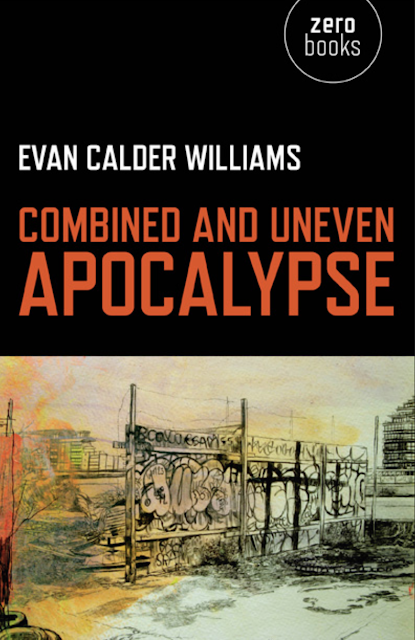"Combined and Uneven Apocalypse" by Evan Calder Williams (published 2011)
Similar in its practical (or tactical, whichever you prefer) aim to perhaps John Berger's "Ways of Seeing" (1972), Evan Calder Williams' "Combined and Uneven Apocalypse" (2011) lays bare a different understanding of the world: a world in which its subjects can no longer point beyond themselves to any given cause. The apocalypse is here, it has been, and it will be. So now what? First, Williams really wants us to get a handle on what the apocalyptic actually is - on his terms - so that we can understand what it means to become post-apocalyptic:
"...post apocalyptic here does not mean that we have witnessed the destruction of our society or nation. It means what we don't know who are enemies are anymore. The very category of enemy is rendered diffuse, reduced to the bad smell of fear stinking up the place." (p. 55)
Williams is interested in the literature, language, and filmic readings of zombie films, films about catastrophe, the theory and practice of salvagepunk (as an offshoot, if not opposed to) cyberpunk and more, with an appropriate balance between interpretations of massive blockbuster hits and lesser known, older materials. You need not watch/read these in order to grasp what is going on here (though I have watched a number of those mentioned, because of this book, still you need not): Williams terms - throughout the whole of "Combined and Uneven Apocalypse" are an example of the best teaching of Marxism I've ever read. An excerpt:
"In a more Marxist language: the film [Dawn of the Dead] is a capture not just of how the structuring effects of the 'base' (the organization of productive capacity and the modes of labor there employed to produce value) are registered by the 'superstructure' (the social relations that both support and are produced by modes of production, the realms of culture and 'politics', the whole ideological project of a period and its tangle of contradictory impulses and rules). It is not the issue of critical output reflecting or expressing the economic order, as in the parodic version of Marxism in which everything is unidirectionally 'about' the economy in a banal and dogmatic way. ('What is slapstick hockey comedy about?' 'Class relations'. 'Obviously.') ... Rather, the capture is of the messy passages between base and superstructure." (p. 79, bold mine).
In one of my favorite bits (which takes up a big part of this book), Williams illuminates Marxist theory (put crudely and simply for the purposes of this review) basically by saying: You cannot make the zombie film a film about the problem of unconscious consumerism (the zombies) by those who don't know better, while those who do know better fight them off until they are doomed to the awful fate as well. Rather, how can we begin to see that the undead are in the exact same predicament as us? What can they - the zombies - tell us about how this system we are trying to protect both creates them and enables them just as the system (of the same) they are part of enables us to be and do what we do? Williams calls this a kind of necessary deadlock of the apocalypse that is fundamental to any move forward. Or backward or wherever, any movement at all. In my view this also means: our situation cannot be reduced to or blown up as identity politics, biopolitics, geopolitics, so on and so forth. It will and it does, but that is not the concern here, in what is indeed a gesture towards the post-apocalyptic. Post.
"Rather, the point is to grasp how the unified vision only gains consistency through its relationship to what cannot fit into it and how it provides an ideological backdrop for the material shaping of a world that will preserve those unwelcome zones. In other words, decisively not a flattening of the world and welcoming all equally into the financial fold, but providing the narrative of that as the cover story for an opposite practice." (p. 154)
To clarify: Combined and Uneven Apocalypse is asking for an end to the totality of organizing structures that believe in the hegemonic (for lack of better words) production of a unified whole, a unified whole which, as we can see, leaves a whole slew of poor unfortunate souls behind, not to mention a continuous, cyclical catastrophe that piles up absolutely everywhere, whether we refuse to see it or whether look at it dumbly in the face, albeit in awe (see the Angel of History). The apocalypse offers us something: a mode of understanding that makes whatever is other - the totality of that other - which we fickle humans knows changes week to week or even by the hour, depending on how paranoid or pissed we are - something wholly indifferent to individuality and subjectivity, yet thrives on our unwavering belief that these things exist. This cannot be reconciled.
"Therefore, a different tack here, moving through the dream-image of salavepunk and the nightmare-image of the dead rising, to venture an unstable third: the recognition that the post-apocalyptic is not an image of that to be. It is not that which lies beyond the apocalyptic event. It is a perspectival stance to be taken up now. It is a necessary optic onto the flourishing wastelands... the recognition that the apocalyptic event has been unfolding, in slow motion with sudden leaps and storms. Behind our backs and in front of our faces. In waiting for the cataclysm, we missed the drift of it. In looking for the catastrophe, waiting in the wings or already passed (a certain threshold of no return), we turned away. Instead, we slowly start to recognize that we stand beyond that threshold: we become post-apocalyptic when we start making something of what has been revealed." (p. 158).
To conclude: this book is obviously a labor of love (or hate) on the part of the author, a hell of a headache to read for the reader (but for those who know pleasure like I do, this isn't a problem), and a another awesome addition to contemporary philosophy/critical theory that I'm glad I found. ECW is definitely one of my favorite theorists of all time and I look forward to reading everything written by him in the near :)




Comments
Post a Comment